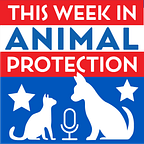
These are some of the stories making headlines in animal protection:
Subscribers can also listen to the podcast above, which includes extended commentary on many issues, including the claim by two professors of race and gender identity that a study they conducted shows shelter dogs with “black” or “Hispanic” names have a longer length of stay, delaying adoption and potentially putting them at risk of being killed. Despite this, study authors tell shelters to keep giving them those names so as not “to accommodate those with racist inclinations,” even if the dogs die. While the proposal is unethical and the evidence in their own study contradicts their claims of racism, these kinds of false and often predetermined conclusions are part of a larger academic pattern that threatens progress in animal rights.
Abused dogs and cats dodged a bullet after Florida’s governor vetoed a bill passed by the legislature to protect puppy mill profits. The bill would have required local governments that banned the retail sale of commercially bred dogs and cats in pet stores to compensate pet stores for lost profits, even though those profits are made on the backs of suffering animals.
Pet stores generally get their animals from Commercial Breeding Enterprises (CBEs), commonly known as ‘puppy mills.’ And CBEs engage in systematic neglect and abuse of animals, leaving severe emotional and physical scars on the victims. One in four former breeding dogs have significant health problems, are more likely to suffer from aggression, and many are psychologically and emotionally shut down, compulsively staring at nothing.
Martin, Orange, and other local Florida counties and cities have passed bans to protect animals from this abuse. The ordinances, however, allow pet stores that want to have animals to partner with shelters and rescue groups. A win-win.
Unfortunately, the governor did not indicate he was doing it for dogs and cats and hinted that with changes to the bill that have nothing to do with animals, he would be willing to sign a similar bill.
Out of the shadows and into the sun. Dogs identified as “pit bulls” are welcome again in Louisburg, KS.
Banning dogs based on how they look is immoral. It is also ineffective. That’s not just opinion; it’s science:
50% of dogs labeled as pit bulls lacked DNA breed signatures of breeds commonly classified as pit bulls;
Dogs targeted for breed discriminatory laws are not more likely to bite, do not bite harder, and such bans do not result in fewer dog bites or bite-related hospitalization rates;
Enforcement is expensive with no measurable impact on public safety; and,
Bans also negatively impact surrounding communities and rescue groups who have to take on the burden of such regressive and selfish policies to save the lives of these dogs.
“When a city has a breed-specific ban, good dogs die. It’s that simple.”

As more people turn to rescue and adoption and more shelters embrace progressive policies, the number of communities placing over 95% and as high as 99% of the animals is increasing:
Alger County, MI, reported a 100% placement rate for dogs and 99% for cats.
Pitkin County, CO, reported a 100% placement rate for dogs, 100% for cats, and 100% for rabbits and other small animals.
Otsego County, MI, reported a 100% placement rate for dogs, 97% for cats, and 100% for rabbits and other small animals.
The shelter that serves Baraga, Houghton, and Keweenaw County, MI, reported a 99% placement rate for dogs and 98% for cats.
Cedaredge, CO, reported a 96% placement rate for dogs and 95% for cats.
These communities and national data prove that animals are not dying in pounds because there are too many, too few homes, or people don’t want the animals. They are dying because people in those pounds are killing them. Replace those people, implement the No Kill Equation, and we can be a No Kill nation today.
A county sheriff that oversees the shelter in Wilson County, NC, wants to join those ranks. The sheriff is requiring all his officers to get certified as veterinary assistants. The training “will help them recognize and quickly identify sickness in an animal,” allowing officers to “make valuable decisions that can help save that animal instead of putting that animal down.”
The Sheriff “said he’s been excited about bringing new programs on board at the animal shelter, including a trap-neuter-return program for community cats.”
By contrast, an Arkansas shelter admitted that it kills healthy animals for space. Despite doing so, it claimed it still qualifies as No Kill as long as it has “a euthanasia rate of ten percent or less, and a live release rate of more than ninety percent.” This is wrong.
A No Kill shelter never kills healthy or treatable animals. The goal of the No Kill movement is not to simply reduce the killing to some consensus-based percentage. It is to end the killing of animals who are not irremediably suffering, and thus return the term “euthanasia” to its dictionary definition.
“Irremediable suffering” means an animal who has a poor or grave prognosis for being able to live without severe, unremitting physical pain even with prompt, necessary, and comprehensive veterinary care.
Moreover, 90% is too low. Given that 99% placement rates are possible because of advancements in veterinary and behavior medicine, that should be the goal of every shelter, and every shelter can achieve it.
“A bid to replace ball boys and girls with dogs at Wimbledon failed miserably.” Although the dogs were “trained to fetch the tennis ball swiftly,” they “often refused to give the ball back…” Instead, they thought it was a game.
According to officials, “the dogs were excellent at fetching the ball quickly but were not so keen on returning them. Our players did find themselves in a game of tug-of-war.” The dogs, however, were willing to give the ball up for a treat.















